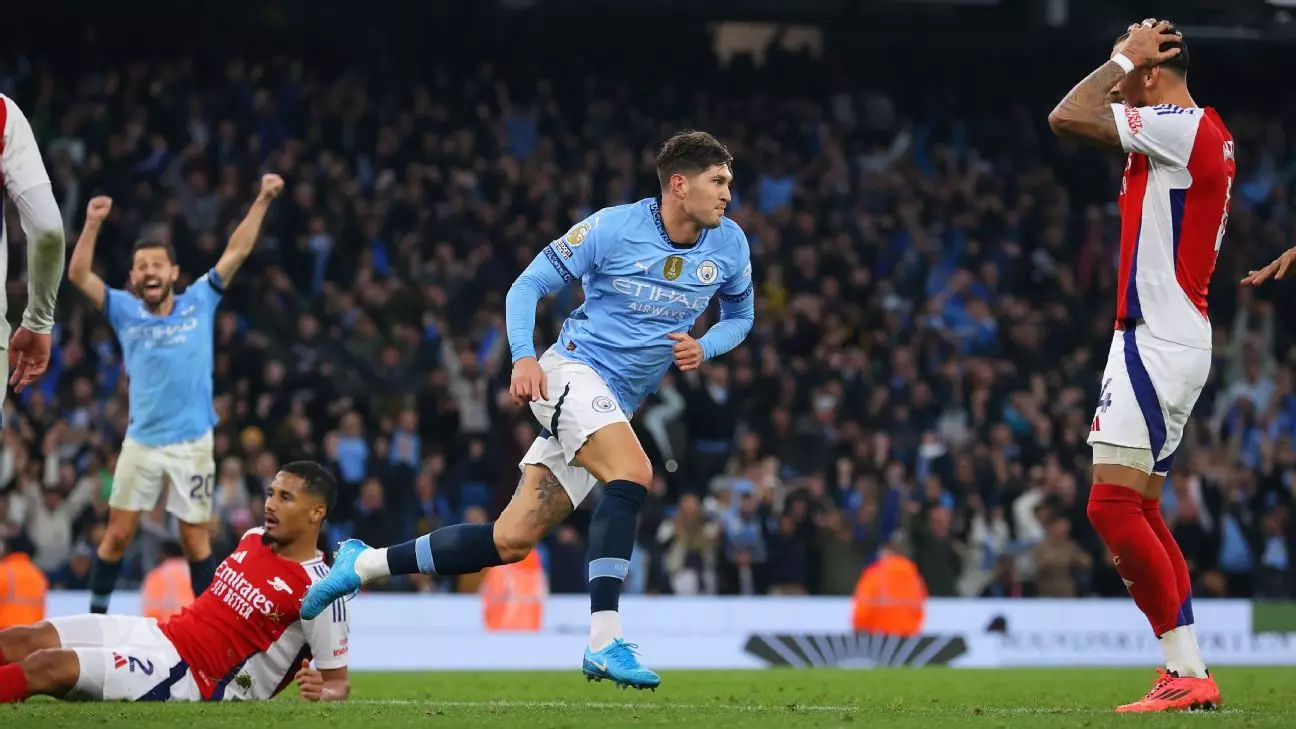In a thrilling clash that saw Manchester City salvage a last-minute equalizer, John Stones described Arsenal’s tactics as either “clever or dirty,” sparking a debate about the ethics of game management in football. The Premier League showdown at the Etihad was marred by Arsenal’s controversial maneuvers following the second-half sending-off of Leandro Trossard, a scenario that intensified discussions around fair play and the tactical framework of the game.
The match was set against the backdrop of high expectations, with both teams vying for top honors early in the season. Arsenal’s strategy, particularly following Trossard’s dismissal, leaned heavily on deep defending, which undoubtedly altered the natural rhythm of the game. As the clock ticked into stoppage time, City found themselves increasingly frustrated, grappling for an opening in a fortress-like Arsenal defense.
Stones, a second-half substitute, acknowledged the difficulty his team faced against Arsenal’s physical and strategic approach. He pointed out how Arsenal stretched the boundaries of conventional play, effectively manipulating the pace and flow of the game. The sentiment among City players was clear: while they respected Arsenal’s right to employ different tactics, they felt that these methods disrupted the match’s integrity. “How they stop the play, how they use the side of football that not many teams do,” Stones commented, underlining their reliance on delaying tactics that hurt the match’s competitive spirit.
The match turned into an exhibition of the so-called ‘dark arts’ of football, wherein teams utilize time-wasting and tactical fouling to gain an edge over opponents. Bernardo Silva echoed Stones’ sentiments, emphasizing that Arsenal’s approach was evident from the very beginning and led to injury issues within the City ranks. Silva’s frustration was palpable when he remarked on the referee’s apparent inconsistency in managing time-wasting, as he recalled how their captain was stopped from recovering his defensive position due to delays orchestrated by the opposition.
The crux of the issue revolves around the debate of whether such tactics enhance strategic acumen or reflect a lack of sportsmanship. Arsenal’s methods indeed threw City off their game, slowing down play and forcing City to contend with a myriad of interruptions. Such tactical execution raises critical questions regarding the ethics of professional football. Should teams be lauded for their intelligence in gameplay or criticized for employing strategies that seem to undermine the flow of the match?
Silva’s observations about the officiating delve into a more significant concern surrounding consistency in refereeing standards. “We have meetings with the FA at the start of the season, and they talk about controlling these situations,” he noted, emphasizing the disillusionment many players feel regarding enforcement of the game’s rules. It brings into question the role of match officials in ensuring that foundational sportsmanship is upheld during games. The crucial moments when referees choose to intervene—or fail to do so—can dramatically affect the outcome and the narrative surrounding the match.
The players’ burden is compounded when officiating does not align with anticipated standards. Hence, the calls for regulation adjustments grow louder, aimed at preserving the spirit of competition devoid of manipulative tactics.
On a positive note for Manchester City, the match concluded with them ascending to the top of the Premier League table, albeit amidst mixed feelings regarding the manner of the result. Stones credited a tactical shift introduced by manager Pep Guardiola that saw him assume a more attacking role, positioning him closer to Erling Haaland, who celebrated his milestone of 100 goals for the club.
As City hunts for dominance, their performance under pressure is invaluable. The potential for mishaps in governance and game management remains a critical focus for teams vying for supremacy. The unfolding debate on tactical methods like those utilized by Arsenal could influence future encounters in the league, underscoring the ongoing evolution of football philosophy.
While the tactical ingenuity displayed by Arsenal may have drawn the ire and frustration of Manchester City, it also points to the inevitable complexities and moral ambiguities that exist within the world of competitive football. As teams continue to reinforce strategic flexibility, it will be crucial for governing bodies and referees to uphold the integrity of the sport, ensuring that the essence of fair play is not lost amidst the quest for victory.

